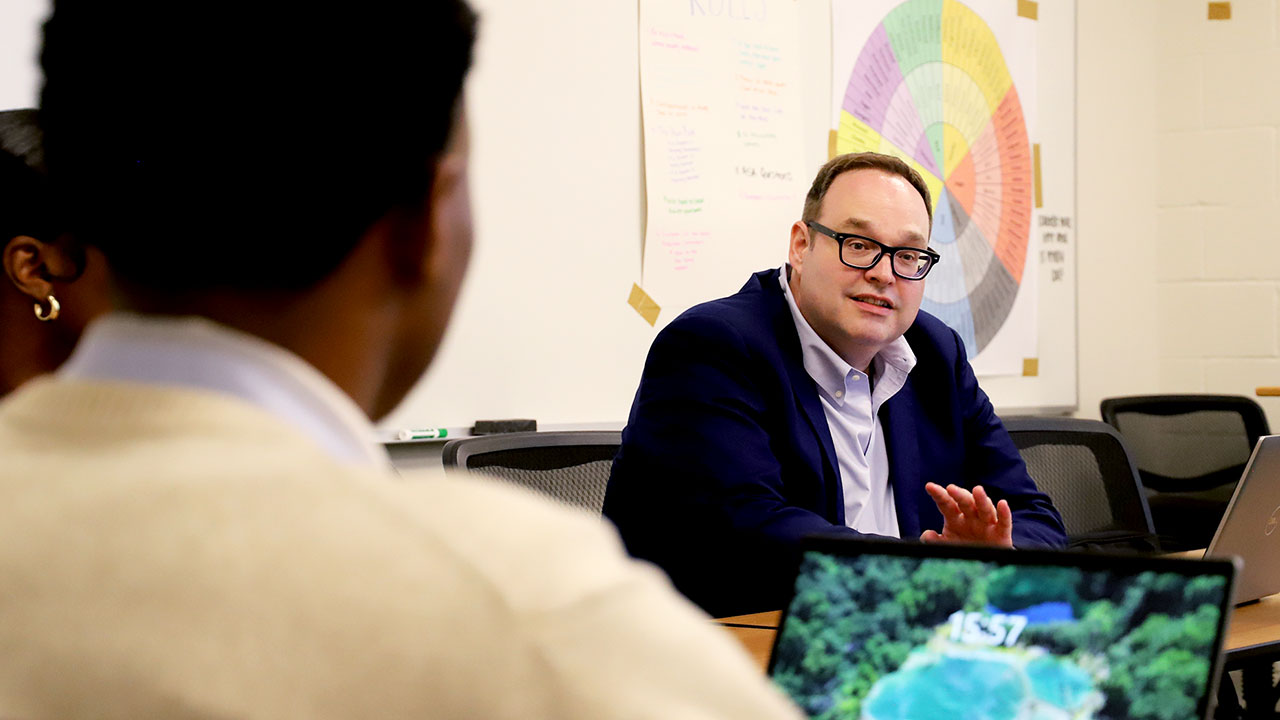content body

Brian McCabe, an associate professor and director of Practicum Training in Counseling Psychology in Auburn's College of Education, is pictured in his lab.
Helping others live out the American dream toward a full and healthy life is a goal Brian McCabe has had for some time.
As a former resident of Miami — where he received his doctorate in counseling psychology and served as a faculty member for the University of Miami — McCabe witnessed firsthand how some new Americans aren’t always able to achieve the dream fully, noting what is called the immigrant paradox.
“They come with great hopes, but sometimes their health gets worse as they’re here — which is not what you would expect or want to happen,” he said.
The immigrant paradox
Today, McCabe is an associate professor and director of Practicum Training in Counseling Psychology in Auburn University’s College of Education, and he remains focused on finding solutions to the paradox. A recent $2.9 million grant awarded by the National Institutes of Health for a collaboration between Duke University School of Nursing’s Rosa Gonzalez-Guarda, Behavioral Assessment’s Richard Cervantes and McCabe will greatly bolster that dream-supporting work.
“Ultimately, we hope that SER Familia will be used across the U.S. to help families be healthier and live out their dreams,” McCabe said.
SER Familia will test whether community health workers, or promotores in Spanish, can successfully help parents and children with a family-based group intervention.
The five-year grant was awarded this past summer and is slated to continue through 2029, specifically focusing on establishing a group intervention program for Latin American immigrants in the Durham, Raleigh and Chapel Hill area known as the Research Triangle. Gonzalez-Guarda and Cervantes serve as the project's principal investigators, with McCabe as co-investigator, along with others including Allison Stafford and Irene Felsman at Duke and Gabriela Nagy at the University of Wisconsin-Milwaukee.
The intervention will use a syndemic approach that addresses overlapping issues, including mental health, substance use, and interpersonal violence. Syndemics are often found in marginalized groups and are made of multiple health conditions that interact due to social and structural factors and inequities.

Duke University School of Nursing’s Rosa Gonzalez-Guarda is a principal investigator on the SER Familia project.
Building community
The study will involve 380 families with at least one parent and one child, with each family receiving a six-session intervention. McCabe and Gonzalez-Guarda will partner with the community agency El Centro Hispano — the longest-serving Latino organization in North Carolina — with work led by co-investigator Pilar Rocha-Goldberg to provide the group intervention and prevention assistance. Ultimately, the goal is for El Centro Hispano and other community agencies to be able to use this intervention to help families beyond the scope of the grant. A kickoff meeting was recently held for the project with community members, and the hope is for families to receive services as soon as January 2025.
“This project represents the culmination of over 15 years of research by our team on acculturative stress, resilience and syndemic health (i.e., cooccurring conditions that have common risk and protective factors and cluster in historically marginalized communities) in the areas of substance abuse, violence, HIV and mental health,” Gonzalez-Guarda said. “We are excited to have the opportunity to work alongside community health workers from the largest Latino-serving social organization in North Carolina, El Centro Hispano, to implement and evaluate the impact of our family-based intervention for immigrant families.”
The study seeks to address the challenges of new Americans, including exposure to discrimination, adverse work and socioeconomic conditions and a lack of insurance and access to linguistically and culturally aligned services. As part of their grant proposal, McCabe and Gonzalez-Guarda noted that many immigrant families can resist, recover and rebound from stress with active coping, positive family and social networks, and their optimism in the American dream. However, prolonged stress exposure to such challenges can erode that resilience, ultimately leading them to have worse health.
"Ultimately, we hope that SER Familia will be used across the U.S. to help families be healthier and live out their dreams.”
Growing support
It is for that reason that McCabe, Cervantes, and Gonzalez-Guarda have developed the SER Familia (Salud, Estrés y Resilencia en Familias—or Health, Stress, and Resilience in Families in English) intervention program — which aims to reduce what is known as acculturative stress, which is experienced through social, psychological and cultural change that stems from the balancing of two cultures while adapting to a new culture and context.
SER Familia was adapted from Familia Adelante (or Families Moving Forward), which was developed by Co-principal investigator Richard Cervantes for families with at-risk children in southern California. The intervention is designed to promote resilience and improve individual and family-level health while supporting strong social networks and the navigation of community resources.
“SER Familia has the potential to prevent declining health patterns we see in Latino immigrant families by reducing acculturative stress, improving resilience and fostering family health. We are also hoping to observe the prevention and reduction of substance abuse, violence, risky sexual behaviors and depression among both Latino immigrant parents and their children,” Gonzalez-Guarda said. “If SER Familia is deemed to be effective, it will have important implications in helping to advance our ability to promote health equity and well-being in Latino communities across the U.S., a community that is generally healthier than the general U.S. but has eroding health patterns over time and across generations.”
Building a better future for all
The College of Education's research — on topics ranging from cardiovascular health to teacher shortages — advances its mission to build a better future for all.
Learn more



